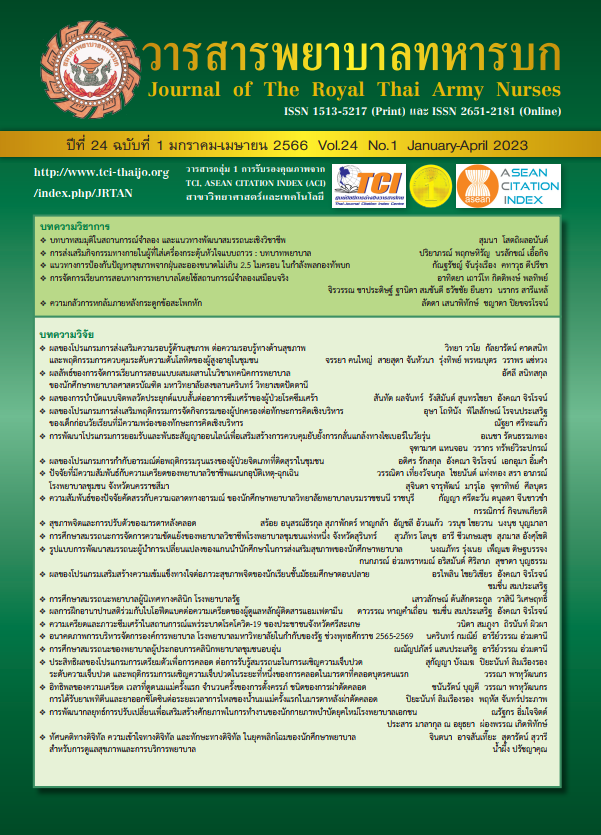Digital Mindset, Digital Literacy, and Digital Skills in the VUCA Era of Nursing Students for Healthcare and Nursing service
Keywords:
Digital mindset, Digital literacy, Digital skills, the VUCA era, Nursing studentsAbstract
This research was quantitative research to study the digital mindset, digital literacy, and digital skills in the VUCA era of nursing students in health services and nursing. Data were collected using a questionnaire with 476 specific nursing students. The research tool was developed by reviewing literature through 3 experts. The Index of Item objectives congruence (IOC) was .78 and the confidence of reliability by using the internal consistency method (Cronbach’s alpha) was .85
The results showed that the Digital mindset of the sample showed that embracing diversity was average at 4.35 and was well followed by the explorer’s mind attitude with a mean of 4.08 at a good level and an abundance mindset, the lowest limit is at a moderately 3.18 average.
Digital literacy, with the highest level of understanding in reach to digital, with a moderate mean of 3.98. and has the lowest Understanding of social digital behavior rules, (Netiquette) at 3.79 at a moderate level.
Digital Skills for Nursing Students in healthcare and nursing services with a total mean of 3.71 at a moderate level. The highest level of ethics in digital online was 3.89 at a moderate level, and the lowest skill level was good image and self-skill at level 3.41 at a moderate level.
From the research results, it can promote students’ digital understanding to develop digital skills related to health care and good nursing services based on having a good mindset.
Downloads
References
Amornrit P. & Cheewakasemsuk A. The use of technology in nursing service management. Renuka Thongkarod. (Editor). Nonthaburi: Publishing House Sukhothai Thammathirat Open University. 2020: 12-51. (In Thai)
Sherwood, G., & Zomorodi, M. A New Mindset for Quality and Safety: The QSEN Competencies Redefine Nurses’ Roles in Practice. Nephrology Nursing Journal. 2014; 41(1): 15–72.
Suwatthipong C.& Cheewakasemsuk A. Unit 13 Digital Technology and Elderly Care Management. In the Study Guide, Course Series 51717, Elderly Care Management. Aree Cheewakasemsuk. (Editor). Nonthaburi: Publishing House Sukhothai Thammathirat Open University. 2018; 13-35. (In Thai)
Harper, K. J., & Brewington, J. G.. Diverse Leadership Needed for a Changing World. Nursing Economic. 2022; 40(1): 46–8 5. Thangkratok P.,Cheewakasemsuk A., & Supamas Angsuphachok. Component Analysis of Confirming Digital Competency of Thai Registered Nurses. Journal of Army Nursing. 2019; 20(3): 276-85. (In Thai)
Williams, C. A. Nursing Students’ Mindsets Matter: Cultivating a Growth Mindset. Nurse Educator. 2020; 45(5): 252–6.
Dendera, R., Janda, M., & Sullivan, C. Are we doing it right? We need to evaluate the current approaches for the implementation of digital health systems. Australian Health Review. 2021; 45(6): 778–81.
Hanna, M. G., Ardon, O., Reuter, V. E., Sirintrapun, S. J., England, C., Klimstra, D. S., & Hameed, M. R. Integrating digital pathology into clinical practice. Modern Pathology.2022; 35(2): 152–64.
Fahy, K. Why Digital Transformation and Automation Aren’t Just Buzz Words in Healthcare Anymore. Journal of AHIMA. 2021. online.
Zurawski, L., & Mancini, N. Engaging Your Growth Mindset for a Successful School Year. Perspectives of the ASHA Special Interest Groups. 2016; 1(16): 91–8.
Lewis, L. S., Williams, C. A., & Dawson, S. D. Effect of a mindset training intervention on Bachelor of Science nursing students. Collegian. 2022; 29 (4): 471–6.
Emmanuel, E. Get it Right: Growth Mindset for Beginning Nursing Students. Nurse Educator.2021; 46(3): E44.
Greenfield, D., Kellner, A., Townsend, K., Wilkinson, A., & Lawrence, S. A. Health service accreditation reinforces a mindset of high-performance human resource management: lessons from an Australian study. International Journal for Quality in Health Care. 2014; 26(4): 372–7.
Ziadlou, D. Strategies during digital transformation to make progress in the achievement of sustainable development by 2030. Leadership in Health Services (1751-1879).2021; 34(4): 375–91.
Cutumisu, M., & Lou, N. M. The moderating effect of mindset on the relationship between university students’ critical feedback-seeking and learning. Computers in Human Behavior. 2020; 112.
Lewis, L. S., Williams, C. A., & Dawson, S. D. Growth Mindset Training and Effective Learning Strategies in Community College Registered Nursing Students. Teaching & Learning in Nursing.2020; 15(2): 123–7.
Artsanthia J, Pitplearn N & Prachyakoon N. Direction of Health care in the pandemic of Coronavirus 2019 in New Normal of Community Nurses. Journal of the Royal Thai Army Nurses. 2022; 23 (1):57-64. (in Thai).
Saithanu K, Thani S,& Luprasong S. Effect of team-based learning on learning outcomes according to Thai qualifications framework for higher education for nursing students in the topic of the therapeutic relationship. Journal of the Royal Thai Army Nurses. 2019; 20(3): 343-52. (In Thai)
Downloads
Published
How to Cite
Issue
Section
License
Copyright (c) 2023 Journal of The Royal Thai Army Nurses

This work is licensed under a Creative Commons Attribution-NonCommercial-NoDerivatives 4.0 International License.
บทความหรือข้อคิดเห็นใดใดที่ปรากฏในวารสารพยาบาลทหารบกเป็นวรรณกรรมของผู้เขียน ซึ่งบรรณาธิการหรือสมาคมพยาบาลทหารบก ไม่จำเป็นต้องเห็นด้วย
บทความที่ได้รับการตีพิมพ์เป็นลิขสิทธิ์ของวารสารพยาบาลทหารบก
The ideas and opinions expressed in the Journal of The Royal Thai Army Nurses are those of the authors and not necessarily those
of the editor or Royal Thai Army Nurses Association.






